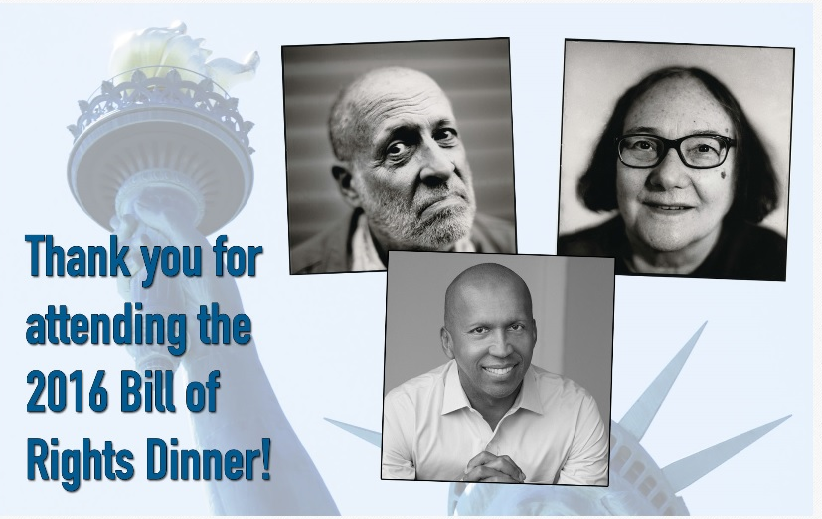This past Tuesday evening, the Massachusetts Chapter of the American Civil Liberties Union held its annual Bill of Rights fundraising dinner. Whistleblower Law Collaborative co-founder Bob Thomas serves on the ACLU and event Boards. By all accounts, the evening was a huge success. In terms of tickets sold and dollars raised for the important work of the ACLU, the dinner exceeded all previous Bill of Rights dinners.
ACLU Bill of Rights Dinner Featured Bryan Stevensen of Equal Justice Initiative
The highlight of the ACLU Bill of Rights Dinner, however, was without question the stirring address of Bryan Stevenson, the Executive Director of the Equal Justice Initiative in Montgomery, Alabama.
Many people in the audience had read his best-selling book Just Mercy. Some were also familiar with his astonishingly courageous work representing death row prisoners. Many of them were exonerated of the charges for which they were condemned to die. Hearing Stevenson speak in person, though, provides another level of inspiration altogether.
Stevenson’s speech elaborated on the same four themes of his Wesleyan University commencement address. It drew audible gasps at times from the audience and ended with an instant standing ovation. In both Just Mercy and in his speeches, Stevenson makes real the kinds of brutal injustices that for most of us are just abstractions. Most of us know that racism is still deeply embedded in our culture. The criminal justice system reflects those biases at every level. But to hear what it is like to represent human beings so thoroughly brutalized by cruelty and unfairness is to understand the nature of the issues at a far deeper level.
ACLU Bill of Rights Dinner Attendees Urged to Avoid Complacency
What makes Bryan Stevenson particularly unusual, apart from his courage and skill and compassion, is his ability to see how we as a nation might get to a better place. Most of us get discouraged by the systemic nature of these problems and opt out of taking them on. He urges us not to sit back in complacency, feeling that these problems are too big to deal with. His recipe involves four steps.
Get Proximate
The first is to get proximate. Many people seek to escape the messiness of living in diversity by engaging in self-segregation and putting up barriers to interactions with other groups. We need the opposite. Only when we know each other, relate to each other, understand that people are just people, can we begin to do the work necessary to break down barriers.
You can’t do it behind the walls of a gated community.
Change the Narrative
The second step is to “change the narrative.” Stevenson points out that our embrace and tolerance of genocide against Native Americans was the foundation for the narrative of white supremacy that made slavery tolerable. He further points out, that unlike Germany, Canada, Rwanda, and South Africa, the United States has never gone through a “truth and reconciliation” process to come to terms with its genocidal past. As a result, the end of slavery did not bring about any change in the narrative of white supremacy, and that dominant narrative continues to this day in the era of mass incarceration, ghettoized cities, and demagogic political candidates. We must change the narrative of white supremacy.
Don’t Abandon Hope
Third, he urges us not to abandon hope. It might be rational to be pessimistic. But, Stevenson, like Martin Luther King, urges us to take a longer view. As King said, the moral arc of the universe may be long but it bends towards justice. Only people who remain hopeful can withstand the pains of setbacks; of seeing systems slow to change; of seeing innocent clients die. Far easier said than done, to be sure. Stevenson is an inspirational speaker, though, because of his embodiment of this hope, despite the extraordinarily difficult and discouraging work that he does.
Take on Difficult Tasks
Fourth, he urges us to take on difficult tasks. Power never relents voluntarily. No person or group who fundamentally changed the world for the better achieved that result by only doing things that were easy. People must make sacrifices and choices. Stevenson describes an elderly man at the back of a courtroom who came up to him after one of his court appearances, pointing out the several scars on his face and head, inflicted at different times in the 1960’s while working to register blacks to vote. The man told him that “Some people would say that’s just an old beat up black man. But they don’t understand. These scars are my medals of honor.”
Conclusion
How does this moving Bill of Rights Dinner speech relate to the work of the ACLU? In at least two ways. First, the ACLU of Massachusetts recently has started a Racial Justice Program, headed by Rahsaan Hall, aimed at addressing systemic racism in our society here in Massachusetts, directly paralleling the work of the Equal Justice Initiative (minus the death penalty work). Second, the ACLU has, for last 100 years, been the champion of the citizen against government power, often referring to the federal Bill of Rights as “the client.” Whether it is advocating for greater transparency in government, or for freedom of speech and assembly, or freedom from unlawful police practices, the ACLU has always stood as a bulwark against government overreach. And in that sense, the work of the Equal Justice Initiative started by Bryan Stevenson and the ACLU have substantial overlap.
Much of the every day news contains is discouraging. But, the ACLU’s Bill of Rights Dinner makes one proud to join the fight in whatever way one can.

